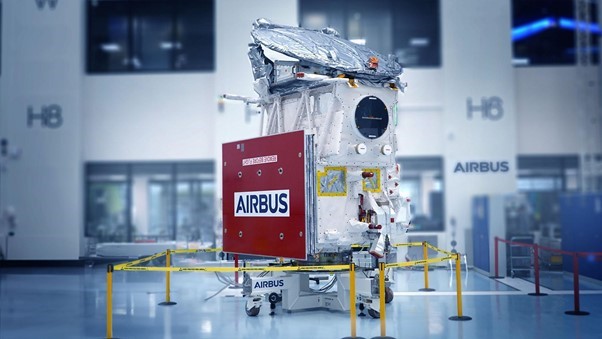ESA-JAXA EarthCARE satellite launched

Above: EarthCARE ready in Airbus cleanroom in Friedrichshafen, Germany
Copyright Airbus
EarthCARE (Earth Cloud Aerosol and Radiation Explorer) is a joint undertaking between the European and Japanese Space Agencies (ESA and JAXA). The satellite will examine the role clouds and aerosols (tiny atmospheric particles) play in reflecting solar radiation back into space (i.e. cooling down the atmosphere) as well as in trapping infrared radiation emitted from the Earth’s surface (i.e. heating up the atmosphere).
“EarthCARE is ESA’s largest and most complex Earth Explorer spacecraft – a flagship mission whose data will help improve the accuracy and reliability of climate and numerical weather prediction models,” said Alain Fauré, Head of Space Systems at Airbus. “International cooperation was key with more than 200 research institutes and 45 companies across Europe working hand in hand to deliver this spacecraft.”
EarthCARE will draw up vertical profiles of natural and human-made aerosols, register the distribution of water droplets and ice crystals and how they are transported in clouds, and provide essential input to improve the modelling of the warming climate and weather forecasting. Aerosols influence the life cycle of clouds, and so contribute indirectly to how they give off radiation – measuring them will give a better understanding of Earth’s energy budget.
Instrumental cooperation: one mission, two agencies, four instruments
The spacecraft was developed, built and tested with the involvement of experts from 15 European countries as well as Japan and Canada, under the leadership of Airbus, in Friedrichshafen, Germany.
The Airbus-built atmospheric lidar ATLID is one of the four instruments on the EarthCARE satellite, providing vertical profiles of aerosols and thin clouds. ATLID is the second spaceborne ultraviolet lidar from Europe following Aeolus’, making Airbus a worldwide specialist in spaceborne lidars.
The satellite also includes a Broad-Band Radiometer developed by ESA through European industry, a Multi-Spectral Imager developed by Airbus’ subsidiary Surrey Satellite Technology Limited and a Cloud Profiling Radar developed by JAXA.
This unique combination of instruments will allow scientists for the first time to directly assess the role of clouds and aerosols on Earth’s radiation budget with one integrated satellite system thereby reducing current uncertainties.
EarthCARE will circle Earth in a Sun-synchronous 400 km polar orbit crossing the equator in the early afternoon to optimise daylight conditions. Weighing 2.3 tonnes, and measuring 18 metres long, once its solar panel and CPR instrument are deployed EarthCARE will be on duty for at least three years.













